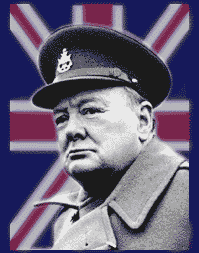| HOME |
The troops had been defeated by what the Allies called blitzkrieg, or lightning war — an advanced military approach to warfare that integrated extensive air support, mechanized troop transport, and tank attacks. The Nazis' first display of blitzkrieg was the invasion of Poland on September 1. In an unprecedented strike of speed, precision, and power, German troops overran Polish defenses. The German Luftwaffe (air force) played a big role by destroying Polish planes, tanks, and morale. German tanks and troops then swept through the breached lines of defense, penetrating to the outskirts of Warsaw in a week's time. By the end of September 1939, Poland had fallen, first to the Nazis and then to the Soviet Union, which captured eastern Poland. The Nazi-Soviet non-aggression pact of August 23 had called for a partition of Poland, and by September 30, the Nazis and the Soviets divided the country between Nazi and Soviet occupation zones. On September 3, 1939, Britain and France declared war on Germany after it refused to leave Poland. Both countries mobilized in preparation of war. France strengthened its Maginot Line, a series of fortifications built along the French-German border that were designed to withstand a German invasion. The French had nearly five million men and 3,000 tanks of good quality. The British reinforced France by sending the British Expeditionary Force (BEF) of 152,000 troops, along with tanks and artillery. During the winter of 1939-40, the world watched and waited anxiously for Germany to attack. But nothing happened. Hitler simply waited until springtime. Then, on April 9, 1940, Germany unleashed a blitzkrieg on the West. First came the successful invasions of Denmark and Norway. Then all eyes turned toward the Low Countries of Belgium, Luxembourg, and the Netherlands. On May 10, the day Winston Churchill replaced Neville Chamberlain as British prime minister, the German Wehrmacht (army forces) recreated its successful blitzkrieg of Poland, combining the air power of the Luftwaffe with rapid offensive strikes by mechanized infantry divisions in its invasion of the neutral Low Countries. Holland fell to the German army in four days, victimized by massive bombings. Belgium and Luxembourg came next. Then, on May 12, German forces attacked French soil and swept across northern France towards the English Channel. The unexpected movement by Panzer tank divisions through the lightly fortified Forest of Ardennes in southern Belgium enabled the Nazis to trap British and French forces at Dunkirk. Nearly 350,000 troops were surrounded by the German army with nothing but the English Channel at their backs. Then, a miracle happened. On May 26, just two weeks after the German invasion of France began, the British ordered the evacuation of their forces. A call for help was placed to the British citizenry. Anyone who owned anything that could float was asked to help convoy Allied troops across the English Channel to safety. In addition to vessels provided by the British Navy, tugboats, rowboats, and even rafts were used to rescue the soldiers in an eight-day heroic effort. The "Miracle of Dunkirk" saved the troops, but it left France virtually defenseless. Paris fell to Nazi troops on June 14. The French High Command, the French army leadership, was in disarray. The Maginot Line was completely ineffective. Hitler simply went around the "impregnable" fortress. The guns on the Line were fixed facing Germany, so they could not even be turned to attack the Nazi troops that came from behind. A week later, France surrendered. Hitler forced the French to submit in the very same railroad car in which the Germans surrendered in World War I. Later, Hitler traveled to Paris and danced a jig beneath the Arch de Triomphe. Then, an angry Hitler turned his attention to the one that got away. The Battle of Britain was the result, a ferocious air war that lasted from August through September of 1940. Said Churchill on the eve of the German attack: "Upon this battle depends the survival of Christian civilization. If we fail, then all we have known and cared for will sink into the abyss of a new Dark Age." Hitler planned to invade Britain by land after his Luftwaffe destroyed British defenses and hammered British cities. The Luftwaffe, whose planes outnumbered those of the Royal Air Force (RAF) by nearly 3-1, did not count on British resolve or the British use of a new technology — radar. Radar gave the undermanned RAF pilots time to react, helping to prevent the destruction of airfields and planes. The bombing began took its toll on the RAF's supply of pilots and planes. But radar neutralized the Germans' numerical advantage, and in October, Hitler postponed the land invasion. German bombers continued to pound British cities and industrial sites for months in what was known as "the Blitz." Night after night the British sought shelter in subways and basements, the air raid sirens wailing through the night. But the British fought on, their morale never broken. |
||
| MAIN | |||
| INVESTIGATION CENTRAL | |||
|
|||
